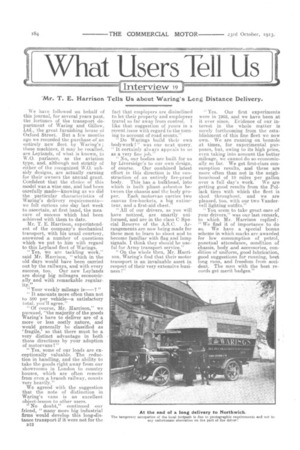at Users Tell Us IWY*M'P K . ' Interview 19 11111 , 1111
Page 24

If you've noticed an error in this article please click here to report it so we can fix it.
'Mr. T. E. Harrison Tells Us about Waring's Long Distance Delivery.
We have followed on behalf of this journal, for several years past, the fortunes of the transport de partment of Waring and Gillow, Ltd., the great furnishing house of
Oxford Street. But a few months ago we recorded the purchase of an entirely new fleet. by Waring's ; these machines, it may be recalled, are Leylands, of what is known, in W.O. parlance, as the aviation type, and, although not strictly of either of the recognized W.O. subsidy designs, are actually earning for their owners the annual grant. Confident that the choice of this model was a wise one, and had been carefully made—knowing as we did the particular characteristics of Waring's delivery requirements— we felt curious one day last week to ascertain, at first hand, the measure of success which had been achieved with them to date.
Mr. T. E. Harrison, superintendent of the company's mechanical transport, with his usual courtesy, answered; a number of questions which we put to him with regard to this Leyland fleet of lArarings. "Yes, we are tackling work," said Mr. Harrison, "which in the old days would have been carried out by the railways, and with every success, too. Our new Leylands are doing big mileages economically and with remarkable regularity. '
" Your weekly mileage is—? "
" It amounts more often than not to 500 per vehicle—a satisfactory total, you'll agree."
"Of course, Mr. Harrison," we pursued, "the majority of the goods Waring's have to deliver are of a more or less costly nature, and would generally be classified as 'fragile,' so that there must be a very distinct advantage in both those directions by your adoption of motorvans ?"
"Yes, some of our loads are exceptionally valuable. The reduction in handling, and the ability to take the, goods right away from our showrooms in London to country houses, which are often remote from even a branch railway, counts very heavily."
We agreed with the suggestion that the note of distinction in Waring's vans is an excellent object-lesson to other users.
"No doubt," continued our friend, "many more big industrial firms would develop this long-distance transport if it were not for the D12 fact that employers are disinclined to let their property and employees travel so far away from control. I like that suggestion of yours in a recent issue with regard to the turning to account of road scouts."
"Do Warings build their own bodywork?" was our next query. " It certainly always appeals to its as a very fine job."
" No, our bodies are built for us by Liversidge's to our own design, of course. Our combined latest
effort in this direction is the Construction of an entirely fire-proof
body. This has a bulkhead, into which is built pliant asbestos between the chassis and the body pro per. Each motorvan carries two canvas fire-buckets, a big extincteur, and a first-aid chest.'' "All of our drivers, as you will have noticed, are smartly uni formed, and are in the class C Spe
cial Reserve of the A.S.C. Arrangements are now being made for these men to learn to shoot and to become familiar with flag and lamp signals. I think they should be useful for Army transport service."
" On the whole then, Mr. Harrison, Waring's find that their motor transport is an invaluable asset in respect of their very extensive business ?"
"Yes. Our first experiments were. in 1903, and we have been at it ever since. Evidence of our interest in the whole matter is surely forthcoming from the establishment of this fine fleet we now own. We are running on benzoic at times, for experimental purposes, but, owing to its high price, even taking into account the better mileage, we cannot do So economically so far. We get first-class consumption results, and these are more often than not in the neighbourhood of 10 miles per gallon over a full day's work. We are getting good results from the Pollack tires with which the fleet is shod throughout, and we are pleased, too, with our two Vanderyell lighting outfits."
You seem to take great care of your drivers," was our last remark, to which Mr. Harrison replied: "We find it of importance to do so. We have a special bonus scheme in which marks are awarded for low consumption of petrol, punctual attendance, condition of chassis, body and accessories, condition of uniform, good lubrication, good suggestions for running, best long runs, and freedom from accident. The men with the best records get merit badges."




























